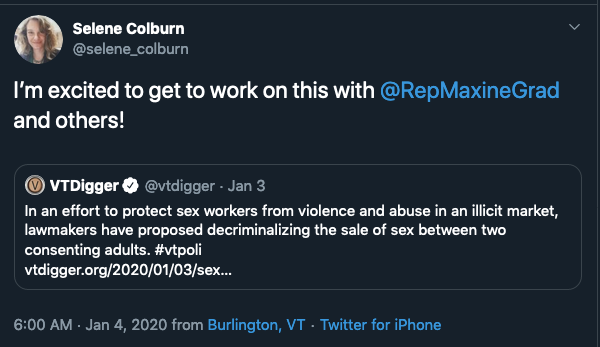Ah, Vermont. The land of Robert Frost, foliage, and the maple kind of sugaring. This seemingly innocuous state is often portrayed as an idyllic land of hamlets and ruddy-cheeked skiers, a sort of pinnacle of Colonial America.
But when considering some of the legislation Vermont has proposed over the last several years, it should come as no shock that they are among the first states to propose decriminalizing prostitution. After all, Vermont is making waves on the abortion front, by proposing a bill whose language declares that “every individual has the fundamental right to choose or refuse contraception or sterilization,” and that “every individual who becomes pregnant has the fundamental right to choose to carry a pregnancy to term, give birth to a child, or to have an abortion.” Vermont was the first state, additionally, to legalize gay marriage in 2009.
However, the state's radical-seeming legislation doesn't just extend to social issues. In 2018, Vermont made national news by offering people $10,000 to move to the state and work remotely, a ploy that would bring more income to the state vis a vis out-of-state jobs, which wouldn't overburden the already-saturated labor market present.
So the recent news that Vermont is planning to propose a 2020 bill to decriminalize prostitution shouldn't come as a surprise, considering the small state's zanny and creative legislation.
According to the Valley News: "The bill, only four pages long, would repeal current sex work statutes prohibiting the act. Human trafficking and the sale of sex that is coerced in any form would still be illegal under the legislation, but it would decriminalize the sale of sex between two consenting adults.
Rep. Selene Colburn, P-Burlington, said she introduced the bill primarily to protect sex workers from the risks inherent in the illicit profession. Research has shown that where sex work is criminalized, sex workers experience far higher rates of sexual and physical violence from their clients and abuse from law enforcement."
This bill, if it goes through, could be a landmark victory for sex workers and their advocates, prioritizing safety, health, and stability for providers and their clients. Unlike the Nordic Model, which criminalizes clients, decriminalization prosecutes neither worker nor john, freeing up both to negotiate safely, and with consent.
Legislation of this tenor would be a glaring opposition to the patently harmful laws of FOSTA/SESTA, wherein sex trafficking and consensual sex work are equated and equally policed. Decriminalization, or even the conversation about decriminalization, however, would be a solid first step towards distinguishing the vital differences between the two.

Colburn seems to be one of the only politicians speaking to this distinction. "By decriminalizing sex work, the practice wouldn’t become a legal, regulated market, Colburn explained. Rather, sex work would not be illegal in the state, so charges could not be brought against a sex worker or the person paying for sex. Colburn said she wants to take this step because she doesn’t view sex work as public safety threat."
Colburn, who is a progressive Representative for the state of Vermont, is a native of Burlington. She has a background in championing and supporting multiple causes, the strongest among them reproductive rights and literacy. She cites her daughters as inspirations for the work she does.
In fact, Bernie Sanders – he of Vermont, in fact – voted in favor of FOSTA without prejudice or comment, although he has managed to gain some positive traction for supporting the new Khanna bill to "examine" the impact of FOSTA:
"On Tuesday, Khanna introduced a bill to study the impact of FOSTA-SESTA, looking at whether it has actually reduced trafficking and whether it has made sex workers less safe. Two candidates for the 2020 Democratic presidential nomination also support the legislation: Sen. Elizabeth Warren is introducing it in the Senate, and Sen. Bernie Sanders is an original sponsor.
For this legislation, Khanna worked closely with sex worker rights groups, he told Vox, including HIPS and Reframe Health and Justice, a consulting collective that focuses on marginalized communities.
If the bill passes, it could likely one day lead to a repeal of FOSTA-SESTA. That, in turn, could be a step along the way to the decriminalization of sex work, something sex worker rights groups have been recommending for years."
It might be tempting to exclude him from this narrative, but Sanders is crucial to Vermont politics and culpable for FOSTA (and has played "I can see both sides of it" for the better part of the last year, thanks in part to many wasted opportunities like these).
As we've seen in conversations about the 2020 presidential candidates and their utter lack of support for sex workers' rights, even while the topic of sex work is picking up steam socially, there have as yet been very few politicians willing to go to bat for advocacy and decrim – much less propose legislation that walks that walk.

